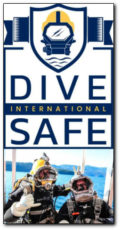Death of a Diver: The Human Cost of a Diving Accident (CADC MAG ARTICLE)
By CADC Admin ~ July 2nd, 2018. Filed under: Latest Diving News, Safety, Standards and Regulations.
(ED NOTE: This is a reprint of the article – ” Death of a Diver: The Human Cost of a Diving Accident” published in the 2018 Summer Edition of the CADC Magazine – downloadable below.) This reprint also features a presentation by Joey Oickle – the person charged with the violating several safety regulations – which resulted in the death of diver Larry Collins. He has agreed – in the interest of safety – to acknowledge the lessons learned from the accident to possibly prevent such incidents in the future. In an accident – the event affects ALL those involved. Hopefully Joey’s story gives some insight on the human cost of an accident – ANY accident. Here is his message.)
There is no question that occupational diving has the potential to be one of the deadliest professions in the world, where the result of a momentary lapse in judgement is literally the difference between life and death. In order to steer clear of tragedy, there are several safety measures and regulations that need to be fully understood and followed in order to create a safe work environment for everyone. To do otherwise only courts disaster.
Six years ago, Joey Oickle was the proud owner of CJM Fisheries Ltd., a Nova Scotia-based seafood company that specialized in sea urchin harvesting. Joey had been involved in the commercial fishing industry for almost two decades, first starting as an inexperienced scuba diver before discovering a true passion for the job.
“After my first year, I knew I wanted to someday have my own boat and crew and do this for as long as I possibly could,” says Joey. “I enjoyed it like nothing else in the world, and I was really enthusiastic about this fishery.”
Sea urchin harvesting is a lucrative, yet labour-intensive process during which scuba-equipped dive crews hand-pick urchins from the tidal zone, often working in low-visibility conditions and strong ocean currents. In early January 2012, Joey placed an internet ad to seek new divers and was introduced to Lawrence (Larry) Collins. Larry was a graduate of the Seneca College commercial dive course. Though he had very little practical work experience, Collins was hired and quickly moved from Ottawa to Nova Scotia on February 15. Larry lived under the same roof with Joey and his family while Larry got his start in the new locale of Westport, NS.
A fateful day
On Wednesday, February 22, 2012 at 10:30 a.m., Joey took his crew out on the rough waters of the Bay of Fundy to a more sheltered area off Brier Island to harvest sea urchins. En route, Joey and another diver, Kyle Street, gave instructions to Collins about the harvesting process. In full scuba gear, Collins was directed to follow Street and another diver, Dan MacFarland, 22 metres to the bottom, where he would be shown how to collect the urchins. Then, once he was comfortable, he would be left to work alone in his own area.
When the divers reached bottom, Kyle noticed that Larry was having trouble maintaining his position due to the strong currents. He showed Larry how to collect sea urchins and about a minute later noticed that Larry was floating further away from his work area but didn’t appear to be in distress.
After about 15 and 20 minutes underwater, Dan and Kyle returned to the surface, but after a few moments, there was no sign of Collins. Those who were topside did a 15-minute search of the water’s surface and when he still couldn’t be found, Joey hailed a mayday to the coast guard, who conducted intensive search and rescue operations in the area.
As soon as Joey made the mayday call, Kyle did an underwater search and discovered Collins’ sea urchin bag sitting on the sea floor.
After two days of searching conducted by Joey and his dive crew, other fishing boats, the coast guard and military personnel, the search was called off when it was decided that the chance of finding Collins alive was unlikely.
Larry Collins was never found.
“Larry’s family was forever affected by the loss of their family member and, because his body has never been recovered, they will never know what happened or why Larry never came to the surface. Being forced to live with questions that don’t have answers can be worse than anything else,” says Joey. “Even though they weren’t at fault, my crew also lives with what happened and certainly wonders if they could had done more. This one day changed so many lives, not just [Larry’s], mine or my family’s.”
A slew of safety issues
Although cleared of any criminal wrongdoing by the RCMP, it was determined by a Labour Department investigation that there were several areas that Joey fell well short of in providing a safe working environment for his crew.
Joey was found to have violated the Occupational Health and Safety Act (OHS) and sections 6(2) and 12(1) of the Occupational Diving Regulations (ODR) by not ensuring that Collins had a current Certificate of Medical Fitness—which he did not.
Joey also failed to maintain proper divers’ log books (contrary to sections 83 and 84 of the ODR), lacked a dive plan (contrary to section 20 of the ODR), neglected to mark the dive site (contrary to section 29 of the ODR), and had none of the safety precautions in place for a dive without a lifeline, as required by section 49(1) of the ODR.
There was no two-way voice communication with the surface (contrary to section 32(2) of the ODR, and the divers worked alone, outside any visual or physical contact with each other (contrary to section 49(1)), which was particularly concerning given the strength of current that day.
In addition, Joey admits he did not have the requisite knowledge and experience of a competent diving supervisor, which is required by CSA standards.
“Looking back at why I didn’t follow the diving regulations, it was mostly due to ignorance,” says Joey. “When I first started, there were very few rules and regulations in the seafood harvesting industry, and I felt that if I operated in the same way as my previous bosses, everything would be fine. As the years went by with my own boat and crew never having an incident, I felt I was doing a great, safe job and that we were immune to ever having an accident.”
Repeating regulatory wrongdoings
In March 2012, CJM Fisheries was issued a Stop Work Order by the Department of Labour until it could be determined that Joey was in compliance with all workplace rules and regulations. But with the process being slow, seven months having passed, and bills piling up, Joey made the unwise decision to ignore the Stop Work Order and went out to harvest sea urchins on October 26, 2012.
Again, three divers entered the water and separated on the bottom to harvest urchins. Two divers later surfaced by the boat—but there was no sign of the third diver, who, it turns out, had surfaced too far away for anyone to see his lift bag or hear his air horn. He was rescued 30 minutes later by a coast guard cutter—the diver had drifted five miles from Joey’s boat.
“When this second incident happened, I panicked. It was like reliving a nightmare,” says Joey. “I immediately called for help and—thank God—this time my diver was safely found. I repeated all the same mistakes as the last time and didn’t create a safe work environment for my crew. This day could have led to someone being hurt or killed. Fortunately, it was a day I got lucky.”
Preventing future tragedies
Fully understanding how his actions were opening the door to disaster, Joey plead guilty in 2015 to his ODR and OHS violations and was penalized a total of $62,150. In addition to publishing safety advertisements—like this article you are reading right now—the penalty imposed upon Frank Joseph Oickle by the Provincial Court of Nova Scotia for violating the Occupational Health & Safety Act consists of:
- $41,000 in fines;
- $6,150 victim fine surcharge;
- $10,000 donation to the Public Education Trust Fund established by the Minister of Labour & Advanced Education;
- $2,500 for publishing safety advertisements (including this article); and
- $2,500 for travel costs related to making safety presentations.
Joey was also ordered to complete 10 safety presentations to emphasize what he failed to do, the tragic outcome of his negligence, and what supervisors must do in order to avoid similar incidents.
“Beyond my fines and presentations, the results of these events—which were created by me—has changed my life forever,” says Joey. “I went from living the happiest time of my life to suffering with extreme depression. My family has seen our lives fall apart, and I have shamed my name in an industry that I have been a part of for over 20 years.
“But I still realize that, while I can rebuild my life, Larry will never have that opportunity. Thinking about all of this—about Larry and about the day of his drowning—will be something I will have to live with forever.”
Today, Joey is now back working in the commercial fishing industry, where he seeks to continue his education and training.
Whenever he steps aboard a boat, he thinks back to Collins and that depressing day in February 2012. He is more aware of the importance of workplace safety and following the rules, and he is not afraid to share his story with others if it can help save lives.
“I hate to see people making the same mistakes I did, to see them believing that an accident could never happen to them,” says Joey, stressing that rules and regulations are put in place for everyone’s safety.
“You can’t ever ignore the rules. It isn’t worth it to run the risk of witnessing someone being hurt or killed. It will haunt you forever.”
By Paul Adair, Staff Writer, CADC Magazine






